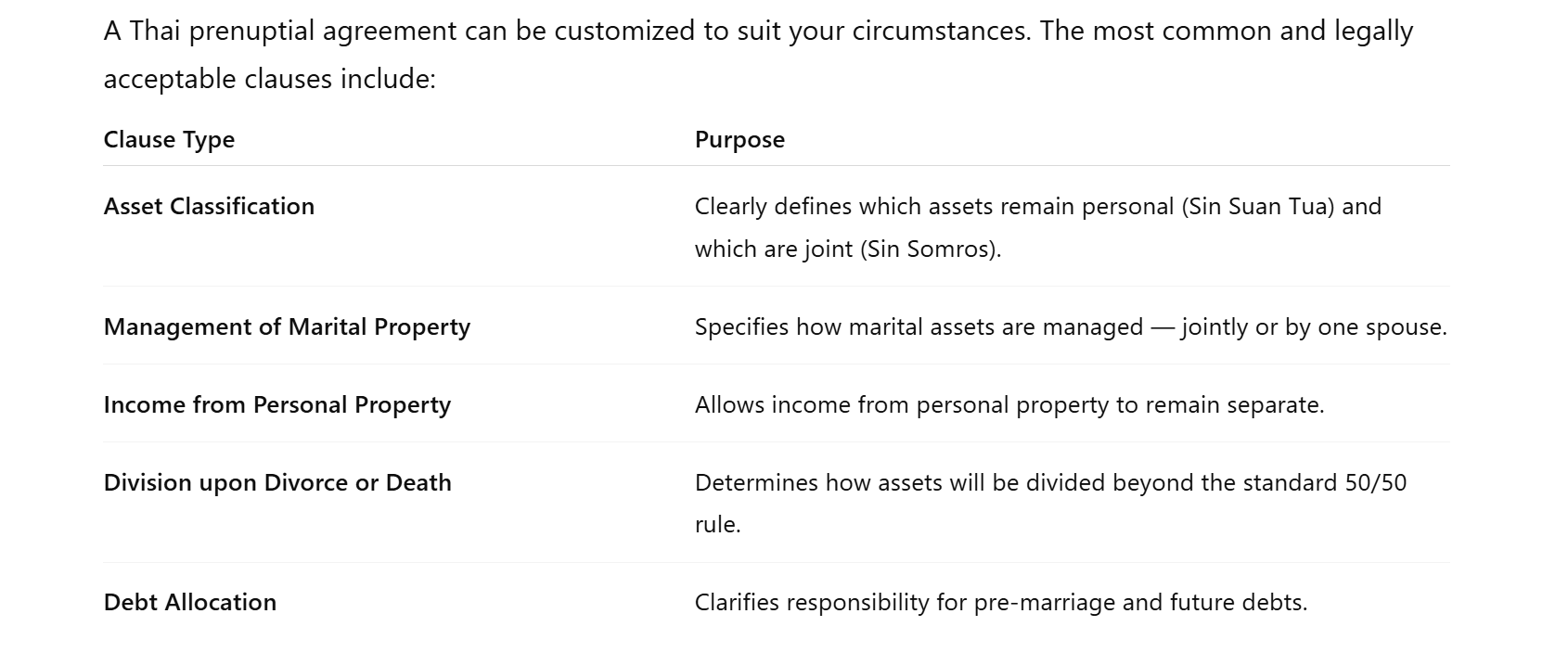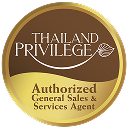The Essential Guide to a Prenup in Thailand
Getting married in the beautiful Land of Smiles is a dream for many. Yet, while wedding planning is full of romance and excitement, discussing a prenuptial agreement (prenup) might not be. However, for any couple — especially those entering an international marriage — a well-drafted prenup in Thailand is not a sign of mistrust but a gesture of transparency and foresight.
It protects both parties by clarifying financial rights and responsibilities, ensuring that love and trust are matched with clarity and mutual respect. This guide will walk you through everything you need to know about Thai prenups — from legal foundations to practical steps for creating one that’s valid and enforceable.
Why Consider a Prenuptial Agreement in Thailand?
For foreigners marrying a Thai national, a prenup is highly advisable. Thai marriage law governs property ownership and division differently than in many Western countries. Without a prenup, any property acquired during the marriage is considered jointly owned marital property (Sin Somros) and is typically divided equally in the event of divorce.
A prenuptial agreement lets you opt out of this default system, allowing you to:
- Protect pre-existing assets, inheritances, and business interests.
- Define ownership of income and future investments.
- Avoid lengthy disputes or legal uncertainties later.
In short, it is a smart legal safeguard that sets clear expectations and ensures financial peace of mind for both partners.
Understanding Key Legal Concepts in Thai Marriage Law
To understand how a prenup functions, it’s essential to know Thailand’s two key property classifications:
1. Sin Suan Tua (Personal Property)
This includes assets that remain individually owned and are not subject to division upon divorce. Examples include:
- Property owned before the marriage.
- Personal items (clothes, tools, or instruments).
- Gifts or inheritances explicitly stated as personal.
- The engagement gift (Khongman).
2. Sin Somros (Marital Property)
Jointly owned assets acquired during the marriage, including:
- Property or income earned during marriage.
- Gifts or inheritances specified as joint property.
- Income from personal property (e.g., rental income from a condo owned before marriage).
➡️ Without a prenup, even income generated from personal property becomes marital property.
What Makes a Prenup in Thailand Legally Valid?
A Thai prenup is only valid when it complies with the Thai Civil and Commercial Code — primarily Sections 1465–1466. The key requirements are:
- Must be in writing (oral agreements are void).
- Must be signed by both parties in the presence of two witnesses.
- Must be registered at the same District Office (Amphur or Khet) where the marriage is registered.
If these steps are not followed precisely, the agreement will not be enforceable. Legal advice is essential to ensure both partners fully understand the terms, particularly if there is a language barrier.
📘 Reference: Thai Civil and Commercial Code – Family Law (Book V)
Permissible Clauses You Can Include in a Prenup

What You Cannot Include
Certain matters cannot legally be part of a prenup:
❌ Child custody or support provisions.
❌ Spousal maintenance (alimony).
❌ Clauses violating Thai public policy or “good morals.”
These issues are handled by Thai courts at the time of separation or divorce.
Step-by-Step: How to Create a Valid Prenup in Thailand
1. Hire a Family Law Attorney
Engage an experienced Thai family lawyer. Avoid online templates — they often fail to meet legal requirements. Each party should ideally have independent counsel.
2. Draft and Review the Agreement
The lawyer drafts the document based on full financial disclosure. Hidden assets can invalidate the prenup. If one party is foreign, ensure accurate translation of every clause.
3. Register at the Amphur Office
The prenup must be submitted on the same day as the marriage registration. The District Officer will record it alongside your marriage documents.
⚠️ Prenups cannot be registered after marriage.
Cultural Note: Sinsod (Dowry) vs. Prenup
Sinsod — the traditional dowry — is a gift from the groom to the bride’s parents as a gesture of respect and gratitude. It is not part of marital property and is not returned upon divorce. A prenup should simply acknowledge it as a separate matter to avoid future disputes.
Prenup Costs in Thailand

What Happens Without a Prenup
Without a prenup, all income and assets acquired during marriage automatically become Sin Somros. In a divorce, these are divided equally, regardless of who earned or purchased them. This can be problematic when one spouse owns a business or enters the marriage with substantially greater assets.
Enforcing a Prenup in Divorce
During divorce proceedings, the court will enforce a registered prenuptial agreement if it meets all legal standards and contains no void clauses. The prenup will guide property division, significantly simplifying and expediting the process.
Common FAQs
1. Is a foreign prenup valid in Thailand?
Possibly — but it must not conflict with Thai law or public policy. For maximum protection, draft a new prenup under Thai jurisdiction.
2. Can a prenup be signed after marriage?
No. It must be registered at the same time as the marriage.
3. Can a prenup be changed later?
Yes, but only through mutual consent and court approval.
4. Can I draft a prenup without a lawyer?
Technically yes, but highly discouraged — improperly drafted prenups are often void.
Final Thoughts
A prenuptial agreement in Thailand is not about love or doubt — it’s about clarity and fairness. It ensures both partners start their marriage with transparency, mutual respect, and confidence about their financial future. Whether you’re marrying a Thai national or relocating together, investing in a well-drafted prenup is one of the most responsible decisions you can make.
References
- Thai Civil and Commercial Code – Family Law (Book V)
- Siam Legal International – Prenuptial Agreements in Thailand
- Thailand Law Forum – Marriage and Property under Thai Law






.jpg)










